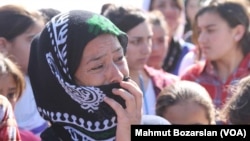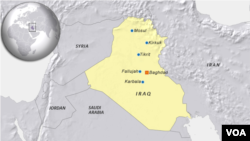Yazidi advocates and rights activists say that, as Iraqi forces gear up to retake the northern city of Mosul, they are concerned about the safety of hundreds of women held by the Islamic State group as hostages, prisoners and sex slaves.
"Some women need urgent help, some women are traumatized, some women have been violated – punished many times," said activist Khidher Domle.
He said rescued Yazidis have reported that women who have tried to run away from the militants and are recaptured are punished and thrown into IS-run prisons. They include foreigners.
It’s important “before starting the liberation process of any area” to find out from activists where victims are and how to deal with them, Domle told VOA on the sidelines of a conference at a Yazidi temple in this northern Iraqi village.
Domle is among at least several independent activists tracking Yazidi women and children through a network of informants. He said they, as well as foreign captives, would be at risk if military forces did not coordinate with activists.
"There should be an international campaign starting now on this subject before liberating big cities like Fallujah and Mosul," Domle said.
IS extremists took thousands of Yazidi men, women and children hostage when they stormed through northern Iraq in 2014. Most of the men are believed to have been killed.
Although several thousand women have been rescued or ransomed since then, more than 2,000 Yazidi women and their children are believed to still be in IS hands, many bought and sold as slaves. Those who have managed to escape have spoken of horrific levels of violence, including beatings, torture and repeated rape.
Training needed
Military forces should be prepared, said Gregory Stanton, president of the group Genocide Watch and a professor at George Mason University in northern Virginia.
"Military advisers for the Iraqi military and peshmerga – that would include American military advisers – need to stress some training is needed," he told VOA. "It is a key part of the training and must be done before they start."
Trainers "must make it clear that they are not to engage in any activities that might be damaging to the women involved, and also that they be particularly sensitive to the trauma these women have been through."
The IS group is made up mainly of Sunni Arabs, joined by a large contingent of foreign fighters.
The collective military forces aiming to liberate Mosul include not only Kurdish peshmerga, but also local Sunni Arab tribespeople working with the Iraqi army and Iraqi government-sanctioned Shi’ite militia.
Confusions arise in conflict
There are concerns that as these forces attack Mosul, women of the ethnic and religious minority Yazidi sect could fall victim to another wave of violence or face new trauma if they can’t differentiate between their Arab-speaking captors and Arab-speaking liberators.
"Arabs are going to take part in liberating Mosul, and Arabs had a part in what happened in Mosul. That is why there is this fear," said Parez Omer of Zhinan, the Women’s Union of Kurdistan.
Many believe locals in the predominantly Sunni Arab city supported the Islamic State.
Omer alluded to the fact that, in violent conflicts, women sometimes have been victimized by various fighting forces – even their alleged rescuers. "… It has happened that when a girl is freed by other people, she has been raped, and the violence against her is repeated," she said. So, like Stanton, she called for "instruction to the peshmerga and other people."
The operation to free Mosul started in March but stalled out after fierce battles in villages southeast of the city. Residents fleeing the fighting reported stiff resistance from IS militants in the face of punishing airstrikes and Iraqi ground forces.
Iraqi forces surround Fallujah, where a state of siege has brought civilians trapped in the city to the brink of starvation.






